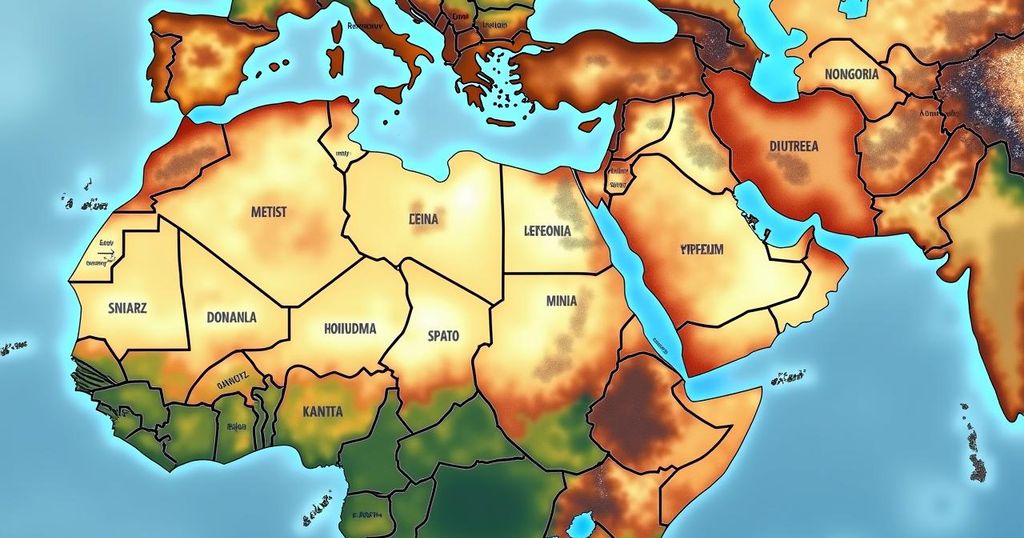Eritrea Forms Alliances Against Ethiopia Amidst Rising Tensions

Eritrea, alongside Somalia and Egypt, held a summit to strategize against Ethiopia, amidst rising regional tensions. The leaders expressed concerns over external interference and promised to enhance cooperation, particularly to support Somali state institutions against terrorism. Despite aggressive posturing and military maneuvers, experts suggest an outright conflict remains unlikely due to internal issues faced by the countries involved.
On October 10, Isaias Afwerki, the longstanding leader of Eritrea, convened a trilateral summit in Asmara with President Hassan Sheikh Mohamud of Somalia and President Abdel Fattah el-Sisi of Egypt. The meeting aimed to address shared regional concerns and “confront interference in the internal affairs of the countries of the region under any pretext or justification,” as detailed in a joint statement following the discussions. The three nations also emphasized the need to bolster cooperation to strengthen Somali state institutions, enabling Somalia to better combat terrorism and safeguard its territorial integrity. This summit marks a significant moment in the context of rising tensions between Ethiopia on one side and Eritrea, Somalia, and Egypt on the other. Relations between Ethiopia and Somalia have deteriorated since January following Ethiopia’s agreement to recognize the independence of the controversial enclave, Somaliland, which Somalia asserts as its territory. The situation intensified as Egypt seized the opportunity to exert pressure on Ethiopia amidst ongoing disputes over the Grand Ethiopian Renaissance Dam (GERD), a project Cairo perceives as a danger to its critical water supply. In recent months, Egypt has intensified its military alignment with Somalia, including sending arms shipments and discussing the potential deployment of troops as a replacement for the Ethiopian forces currently engaged in combatting Al-Shabaab. Somalia, viewing the situation unfavorably, has threatened to expel Ethiopian forces by year’s end unless the aforementioned memorandum of understanding is rescinded. Eritrea’s complex relationship with Ethiopia adds nuance to this evolving geopolitical landscape. Although Eritrea initially supported the Ethiopian government during the Tigray civil war, tensions have surfaced with Eritrea apprehensive about Ethiopia’s intentions toward its coastal access, lost following Eritrea’s independence in 1993. Political analysts highlight that Afwerki perceives a future threat of direct conflict, leading him to forge alliances with Ethiopia’s regional adversaries. Nonetheless, experts caution that despite hostile rhetoric, military confrontation remains improbable for the time being. Somalia’s military capabilities are insufficient against Ethiopia, while Egypt wrestles with its internal challenges, including an economic crisis and ongoing conflicts in the Middle East. Regionally, Eritrea is still recovering from its prior conflicts, and Ethiopia is contending with two internal insurgencies. Analysts suggest that the current posturing is more diplomatic than militaristic in nature, reflecting a precarious balance of power rather than impending war. Looking ahead, the regression of progress achieved during the 2018 rapprochement between Ethiopia and Eritrea is a troubling sign, suggesting a return to a tense status quo, characterized by a “no war, no peace” scenario. Analysts warn that these developments require careful monitoring, given their implications for regional stability and security.
The dynamics of East African geopolitics have been increasingly complex, particularly concerning the relations among Eritrea, Ethiopia, Somalia, and Egypt. Historical conflicts, territorial claims, and resource management disputes, such as those surrounding the Grand Ethiopian Renaissance Dam, play pivotal roles in these interactions. The recent trilateral meeting serves as a response to perceived threats and interference among these nations, underlining the fragile balance of power in a region marked by both alliances and enmity.
In summary, the recent trilateral summit held in Asmara illustrates the growing coalition against Ethiopia among Eritrea, Somalia, and Egypt, arising from mutual concerns about territorial integrity and regional interference. While rhetoric suggests a potential for conflict, current realities indicate that military confrontation is unlikely in the near term due to internal challenges facing each country. However, the deterioration of relations, particularly between Eritrea and Ethiopia, underscores a significant shift in the geopolitical landscape, warranting vigilant observation as developments unfold.
Original Source: www.theafricareport.com






